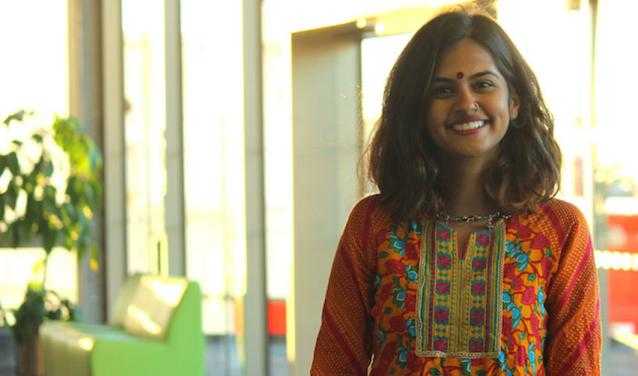Home>“India's immense historical heritage significantly influenced my decision to study social sciences.”

23.01.2017
“India's immense historical heritage significantly influenced my decision to study social sciences.”
Lavanya Pai was born in Bangalore, a city in the South of India, and has lived there for most of her life. Now a second-year student in the Europe-Asia undergraduate programme at Sciences Po, she talks about her life in Le Havre, a small city which now feels like home.
What courses are you studying at Sciences Po?
I am currently a history major student in Le Havre and this semester I am taking a combination of courses across the social sciences with a Euro-Asian focus. I just finished three intensive days of Winter Workshops covering multinational corporations, development and human rights in South Asia which I found to be compelling and helpful in understanding my future career prospects in the area of development and public policy making. Additionally, I took classes regarding European Union law and Contemporary China and I'll be taking the Contentious Politics in South Asia and Along the Silk Route electives. I think the most interesting part of my courses is the Euro-Asian perspective that ties them all together.
Why did you choose to study social sciences?
I think that growing up in India where the subcontinent’s immense historical heritage combines with its political and economic landscape significantly influenced my decision to study social sciences. Accompanying my mother on child labour remediation projects also encouraged me to develop an interest in development and policy making. Studying a course as broad as the social sciences including areas such as economics, law, history, political science and sociology would provide me with a solid foundation for pursuing my career ambitions.
Why did you choose Sciences Po to study social sciences, rather than another university in Europe?
I found Sciences Po to be a unique environment where not only could I reap the advantages of living in a French city and learning French, but I could also find a piece of home in the Europe-Asia campus. Here, I knew I would find a culturally diverse and vibrant environment where people share similar passions for issues and activities related to Europe and Asia, which I personally find very exciting. The number of cultural activities offered at Sciences Po very clearly develops intercultural understanding among its students. I also thought that the small student to teacher ratio would allow for a more personal form of interaction with debates and discussions.
After two years living in Le Havre, how do you feel about the city? What is everyday life like on the campus?
Before coming to France, I had no idea what to expect from the town of Le Havre. I arrived on a quiet Sunday afternoon, the streets were empty and very different from the hustle and bustle of Indian cities. But Le Havre grows on you. When I was back at my family home this winter I often caught myself saying “When I go back home to Le Havre...”, and my parents would politely correct me saying that home was back in Bangalore.
Yes, of course Le Havre does experience extremely wet days but one really realises the beauty on a warm sunny afternoon when you’re walking past the basin and the seagulls fly over your head or on a chilly winter night right before Christmas when the streets are lit up and children are eager and bursting with joy. Plus, sunsets on the horizon of the ocean are always the most beautiful! This port town also harbours a number of historical treasures from artworks of the Impressionist era to some very distinctive 20th century architecture. Le Havre is unique, in a very heart-warming way.
But one cannot be fooled by the quietness of the city because campus life is nothing but busy. Everyone is always rushing from French classes to language classes and then to lectures followed by seminars and ending the day with either one or the other activity. The library is normally filled with students hovering over their books or laptops and the common room is seen with people smiling and relishing their cup of coffee or taking a break by playing table tennis or “baby foot”.
You are the co-captain of the film club on the Le Havre campus. What kind of activities does this association offer?
The film club at Sciences Po offers a sneak peek into global film culture and history as well as cinematic techniques. We host a movie night every week inviting students from the campus to watch movies on political, historical or artistic themes followed by a discussion session which includes critically analysing production techniques, plots and characters. In the second semester, we produce our own short film for the Collégiades, the annual intercampus artistic and sporting tournament, and so we get a hands-on experience of film making, giving opportunities to students of the campus who might be interested.
What are your plans for your third undergraduate year abroad?
I plan on staying in Europe for my third year abroad as I wish to gain more European exposure before I return to Asia after having completed my masters or PhD. My first two choices are School of Oriental and African Studies (SOAS) and UCL in London where I hope to be taking up modules in Development and Asian studies as a follow-up to the social sciences course that I am currently doing. My other choices include universities such as Uppsala in Sweden and Utrecht and Maastricht in the Netherlands.
Related links
- Hear from Lavanya Pai talking about her experience at the Sciences Po Undergraduate College during the Sciences Po Q&A organised on 25 January. Watch the replay of the Q&A (you can select the particular questions you are interested in).
- Learn more about the Sciences Po Undergraduate College